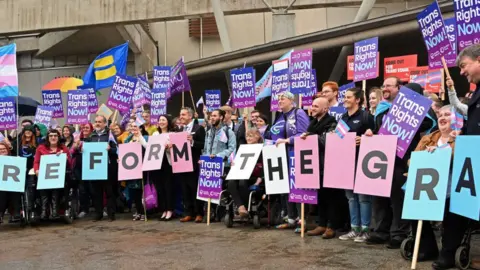Gender recognition bill aims to remove barriers
 Getty Images
Getty ImagesLegislation to reform the process for obtaining legal gender recognition has been published by the Scottish government.
A draft bill has been set out that aims to remove barriers presently in place for an individual to secure the legal recognition of their gender identity.
It includes a proposal to scrap the current requirement for people to apply to the UK Gender Recognition Panel.
Instead, they would apply to the Registrar General for Scotland.
The Scottish government said the measures had been proposed as many view the current system as "traumatic and demeaning".
Period of reflection
The draft bill would also remove the requirement for applicants to provide medical evidence of their diagnosis of gender dysphoria.
At the same time it would retain the requirement that applicants must make a solemn statutory declaration that they have been living in their acquired gender for three months and intend to do so permanently.
A minimum three-month period of reflection between applying for a Gender Recognition Certificate and confirming the application would also be introduced as part of the bill.
It would mean applicants must have lived in their acquired gender for a minimum of six months before a certificate is granted.

The legislation would also retain the position that a false statutory declaration is a criminal offence and introduce a new offence of false application - each with a potential punishment of up to two years' imprisonment.
Meanwhile, the minimum age of application would also be reduced from 18 to 16 as part of the proposals.
The reforms, which follow international best practice adopted in other countries such as Ireland, Denmark and Norway, do not alter the long-standing rights of trans men and women to change gender.
The reforms also do not change the rights of women and single-sex exceptions in the Equality Act.
Equalities Secretary Shirley-Anne Somerville said: "We are proposing these reforms because the current system is viewed by many wishing to apply as traumatic and demeaning.
"A previous consultation on reform showed a majority in support for our proposals but also some concerns.
"Consulting on the detail of a draft Bill and associated impact assessments will, I hope, clearly explain the need for reform and address those concerns."
'Welcome opportunity'
Ms Somerville said for the past 15 years trans people have been able to legally change their gender through obtaining a Gender Recognition Certificate.
She added: "We are proposing to make the current process less stressful whilst continuing to recognise the seriousness of the decision to live your life in a different gender."
Lynn Welsh, head of legal at the Equality and Human Rights Commission Scotland, said: "This bill offers a welcome opportunity to remove unnecessary practical barriers trans people face in securing legal recognition of their gender identity.
"Nothing in the bill will threaten the continued operation of the Equality Act provisions protecting women-only services and spaces, which recognise the particular needs of women and the need for protection from sex-based violence."
Scottish Greens co-leader Patrick Harvie said: "This legislation has been delayed too long already so it's welcome to see the bill finally published.
"The proposals will simply make life easier for trans people who want to get their paperwork sorted out and this has already been done in other countries successfully."
